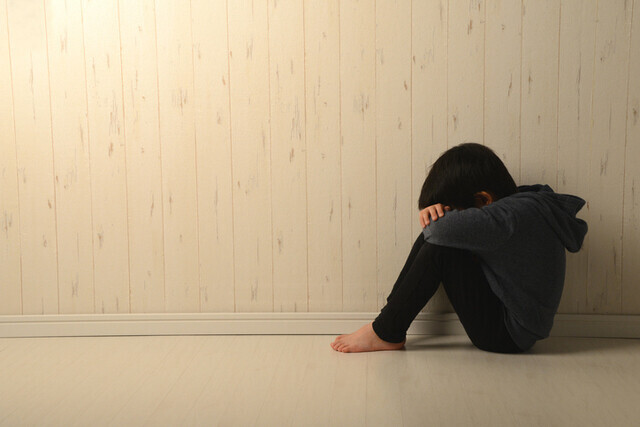hankyoreh
Links to other country sites 다른 나라 사이트 링크
S. Korea to amend law that allows parents to physically discipline children

A Civil Act provision on the disciplinary rights of parents is poised to be struck from the books after 62 years. Amid a series of high-profile cases involving severe child abuse, many observers have argued that the disciplinary action rights provision may be misconstrued as granting parents corporal punishment rights.
On Aug. 4, the Ministry of Justice (MOJ) said it was “an administrative pre-announcement of legislation for a partial amendment of the Civil Act to clearly indicate the prohibition of corporal punishment through deletion of the ‘right to take disciplinary action’ in Article 915.” Created at the time of the law’s enactment in 1958, Article 915 states that a “person of parental authority may, in order to protect or educate his or her child, take necessary disciplinary action against the child, and may entrust such child to a reformatory or correctional institution upon the approval of the court.”
The MOJ said it “hopes that clearly indicating the prohibition of corporal punishment by the Civil Act will contribute to improving social attitudes toward child abuse and a child-raising environment that centers on the child’s rights.”
The MOJ’s pre-announcement of legislation that day is being seen as marking a step forward from the recommendation of the Committee for Legislative Improvements for Inclusive Family Culture, which was made public in May. At the time, the committee submitted a recommendation to the MOJ that included substituting the term “necessary disciplinary action” with “necessary disciplinary education” in referring to parental rights.
As recently as the time of a UN Committee on the Rights of the Child recommendation last year for the prohibition of all corporal punishment, including parental disciplinary action, the MOJ had indicated its reluctance to take direction action, saying only that it would “consider refining the term ‘disciplinary’ action or establish limits.” But with the parents implicated in recent high-profile child abuse cases arguing that they had engaged in “corporal punishment for the purpose of disciplinary education,” the MOJ appears to have concluded that it needed to more clearly state the ban on corporal punishment.
The MOJ amendment to the Civil Act is set to go before the National Assembly after an advance legislative notice period extending through Sept. 14. The MOJ’s plan is expected to be discussed alongside four other planned amendments already presented in the National Assembly, including one that would substitute “disciplinary action” with “disciplinary education.”
By Choi Ha-yan and Kim Jeong-pil, staff reporters
Please direct comments or questions to [english@hani.co.kr]

Editorial・opinion
![[Editorial] Penalties for airing allegations against Korea’s first lady endanger free press [Editorial] Penalties for airing allegations against Korea’s first lady endanger free press](https://flexible.img.hani.co.kr/flexible/normal/500/300/imgdb/original/2024/0502/1817146398095106.jpg) [Editorial] Penalties for airing allegations against Korea’s first lady endanger free press
[Editorial] Penalties for airing allegations against Korea’s first lady endanger free press![[Editorial] Yoon must halt procurement of SM-3 interceptor missiles [Editorial] Yoon must halt procurement of SM-3 interceptor missiles](https://flexible.img.hani.co.kr/flexible/normal/500/300/imgdb/child/2024/0501/17145495551605_1717145495195344.jpg) [Editorial] Yoon must halt procurement of SM-3 interceptor missiles
[Editorial] Yoon must halt procurement of SM-3 interceptor missiles- [Guest essay] Maybe Korea’s rapid population decline is an opportunity, not a crisis
- [Column] Can Yoon steer diplomacy with Russia, China back on track?
- [Column] Season 2 of special prosecutor probe may be coming to Korea soon
- [Column] Park Geun-hye déjà vu in Yoon Suk-yeol
- [Editorial] New weight of N. Korea’s nuclear threats makes dialogue all the more urgent
- [Guest essay] The real reason Korea’s new right wants to dub Rhee a founding father
- [Column] ‘Choson’: Is it time we start referring to N. Korea in its own terms?
- [Editorial] Japan’s rewriting of history with Korea has gone too far
Most viewed articles
- 160% of young Koreans see no need to have kids after marriage
- 2Presidential office warns of veto in response to opposition passing special counsel probe act
- 3[Editorial] Penalties for airing allegations against Korea’s first lady endanger free press
- 4[Editorial] Japan’s rewriting of history with Korea has gone too far
- 5[Column] Park Geun-hye déjà vu in Yoon Suk-yeol
- 6For survivor, Jeju April 3 massacre is a living reality, not dead history
- 7[Guest essay] Maybe Korea’s rapid population decline is an opportunity, not a crisis
- 8[Special Feature Series: April 3 Jeju Uprising, Part III] US culpability for the bloodshed on Jeju I
- 9[Column] America must frankly own up to role in tragic Jeju April 3 Incident
- 10‘My mission is suppression’: Jeju blood on the hands of the US military government